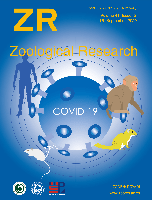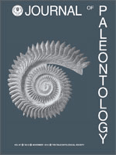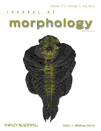
ZOOMORPHOLOGY
Scope & Guideline
Transforming our understanding of zoological evolution.
Introduction
Aims and Scopes
- Anatomical Studies:
The journal emphasizes detailed anatomical investigations across a wide range of species, including vertebrates and invertebrates, providing insights into their structural adaptations. - Morphological Analysis:
Research published in ZOOMORPHOLOGY frequently involves morphological characterizations, focusing on the form and structure of organisms, which are crucial for understanding their evolutionary relationships. - Functional Morphology:
The journal also highlights studies that connect morphology to function, exploring how structural features facilitate specific ecological roles or behaviors in different species. - Comparative Morphology:
A core aim of the journal is to perform comparative analyses across taxa, providing a broader context for understanding evolutionary trends and adaptations. - Ultrastructural Investigations:
Many papers include ultrastructural examinations using advanced microscopy techniques, which reveal intricate details of anatomical features at the cellular and subcellular levels.
Trending and Emerging
- Integrative Morphology:
There is a noticeable trend towards integrative studies that combine morphological analysis with genetic, ecological, and behavioral data, reflecting a holistic approach to understanding organismal biology. - Functional and Adaptive Morphology:
Research focusing on the functional implications of morphological traits is on the rise, particularly in the context of ecological adaptations and evolutionary pressures. - Advanced Imaging Techniques:
The use of advanced imaging techniques, such as micro-CT and scanning electron microscopy, is increasingly common, allowing for detailed examinations of morphology that were previously unattainable. - Developmental Morphology:
Emerging interest in developmental morphology, particularly how morphological traits develop and their implications for evolution, is gaining traction, indicating a shift towards understanding the developmental pathways underlying morphological diversity. - Ecological Morphology:
Studies linking morphology to ecological function, such as feeding mechanisms and habitat adaptations, are becoming more prevalent, showcasing the relevance of morphological traits in ecological contexts.
Declining or Waning
- Traditional Taxonomic Studies:
There seems to be a waning interest in purely traditional taxonomic studies that do not incorporate modern techniques or evolutionary perspectives, as researchers now favor integrative approaches that combine morphology with molecular data. - Generalized Comparative Studies:
Comparative studies that lack a specific ecological or functional focus are becoming less common, with a shift towards more targeted research that emphasizes practical implications or evolutionary significance. - Morphological Descriptions Without Context:
Papers that provide morphological descriptions without linking them to broader ecological or evolutionary questions are appearing less frequently, as the field moves towards more integrative and context-rich studies.
Similar Journals

ZOOLOGICAL RESEARCH
Fostering Dialogue in the World of Zoological ScienceZoological Research, published by Science Press, stands as a premier open-access journal in the fields of animal science, zoology, and ecology. Since its inception in 1980, it has fostered an inclusive platform for innovative research and dialogue within the scientific community, enabling researchers from across the globe to share their findings and insights. The journal's significant impact is underscored by its classification in the Q1 quartile across multiple categories, including Animal Science and Zoology, Ecology, and Nature Conservation for 2023, as well as its impressive rankings within Scopus, placing it in the top tier of its respective fields. Situated in Beijing, China, Zoological Research not only contributes to advancing knowledge but also emphasizes the critical importance of conservation practices in today’s rapidly changing ecosystems. With its commitment to open access, researchers, educators, and students alike benefit from immediate, unrestricted access to vital scientific information, making it an essential resource for anyone involved in the biological sciences.

BMC Zoology
Exploring the depths of animal science innovation.BMC Zoology, published by BMC, is a distinguished open-access journal that has been advancing the field of zoological research since its inception in 2016. With an impressive Q2 ranking in both Animal Science and Zoology categories as of 2023, the journal occupies a significant position in the academic landscape, engaging a global readership dedicated to the exploration of animal biology. Based in the United Kingdom, BMC Zoology prides itself on providing a platform for innovative research, fostering collaboration among scientists, and facilitating access to high-quality scholarly articles. Researchers and practitioners in zoology can benefit from its extensive repository of articles that span various areas including conservation, ecology, and evolutionary biology. As an essential resource for scholars and students alike, BMC Zoology commits to enhancing the dissemination of knowledge in the zoological sciences through its open-access model, ensuring widespread access to cutting-edge research findings.

JOURNAL OF PALEONTOLOGY
Decoding the Mysteries of Fossilized EcosystemsJOURNAL OF PALEONTOLOGY, published by Cambridge University Press, is a leading scholarly journal dedicated to the field of paleontology, featuring a broad scope that covers fossil studies, evolutionary biology, and earth history. With an ISSN of 0022-3360 and an E-ISSN of 1937-2337, this esteemed journal serves as an essential platform for researchers, professionals, and students to disseminate cutting-edge research findings and insights in paleontological science. The journal holds a significant position within its category, ranking Q2 in the 2023 quartiles and achieving a Scopus rank of #51 out of 113 in Earth and Planetary Sciences – Paleontology, placing it in the 55th percentile of its field. Although it does not currently offer open access options, JOURNAL OF PALEONTOLOGY has been a critical contributor to advancing knowledge from its inception in 1979 through to 2024. Its dedication to rigorous research ensures it remains an indispensable resource for those vested in the understanding of ancient life and ecosystems.

CONTRIBUTIONS TO ZOOLOGY
Exploring the Depths of Zoological KnowledgeCONTRIBUTIONS TO ZOOLOGY, published by BRILL, is a premier scholarly journal dedicated to advancing the field of zoological sciences. With an ISSN of 1383-4517 and an E-ISSN of 1875-9866, this journal serves as a vital platform for researchers, professionals, and students seeking to share their findings and insights related to animal science, ecology, evolution, and systematics. Recognized for its high academic standards, it ranks in the top quartile (Q1) for Animal Science and Zoology, and Q2 for Ecology, Evolution, Behavior, and Systematics, reflecting its significance and influence in the scholarly community. The journal has been consistently published since 1994 and continues to contribute pivotal knowledge that informs and shapes contemporary zoological research. Researchers can access the journal through traditional subscription models, ensuring broad dissemination of its impactful articles and studies. Contributions to Zoology plays an essential role in fostering collaboration and discussion within the zoological community in the Netherlands and beyond.

Insect Systematics and Diversity
Illuminating the Complexities of Insect LifeInsect Systematics and Diversity, published by Oxford University Press Inc., stands as a leading journal in the realm of entomological research, boasting an impressive impact factor driven by its rigorous peer-review process and high-quality publications. With a focus on animal science, zoology, developmental biology, and insect science, the journal is expertly positioned to address the complexities of insect evolution, behavior, and ecological interactions. Since its inception in 2017, the journal has rapidly gained recognition, achieving Q1 quartile ranks in multiple categories, including Insect Science and Ecology, Evolution, Behavior, and Systematics, indicating its relevance and prestige within the academic community. Researchers, professionals, and students alike will find invaluable insights, methodologies, and discussions that propel the understanding of insect diversity and systematics, ensuring the journal is an essential resource for advancing knowledge in this dynamic field. The journal provides access to a wealth of information, fostering collaboration and engagement within the global scientific community.

JOURNAL OF MORPHOLOGY
Illuminating the Path of Developmental BiologyEstablished in 1887, the Journal of Morphology is a pioneering publication in the field of morphology, specializing in the anatomical and developmental biology of diverse organisms. Published by Wiley, this journal features high-quality research that spans multiple disciplines, including animal science and zoology, with a current ranking of Q2 in these areas. Although it lacks an open-access option, the journal is committed to advancing knowledge and facilitating scientific communication among professionals in developmental biology, as indicated by its ongoing contributions since its convergence years and up to 2024. With an impact factor that reflects its importance in the scientific community, the Journal of Morphology is a vital resource for researchers, professionals, and students seeking to understand complex morphological processes and their implications in modern science. Its dedication to publishing rigorous, peer-reviewed articles makes it an indispensable asset in the exploration of life's intricacies.

Journal of Comparative Physiology B-Biochemical Systems and Environmental Physiology
Advancing Insights in Biochemical and Physiological ResearchJournal of Comparative Physiology B-Biochemical Systems and Environmental Physiology, published by SPRINGER HEIDELBERG in Germany, stands at the forefront of research in the fields of physiology, biochemistry, and ecological systems. With a commitment to fostering interdisciplinary communication, this journal has been a vital resource since its inception in 1974, converging scientific exploration through the lens of biochemical mechanisms and environmental adaptations in animal systems. Renowned for its rigorous peer-review process, it has achieved impressive rankings, including Q2 in Animal Science and Zoology and Ecology, Evolution, Behavior and Systematics, reflecting its substantial impact within these disciplines. The journal aims to disseminate cutting-edge research that advances our understanding of physiological and biochemical processes while addressing contemporary environmental challenges. While currently operating on a traditional access model, the journal's contributions are crucial for researchers, professionals, and students seeking profound insights into the complex interactions between organisms and their environments.

Zoological Letters
Exploring contemporary issues in zoology with clarity.Zoological Letters, published by BMC, is a premier open-access journal dedicated to advancing the field of zoology and animal science. Since its inception in 2015, the journal has established itself as a critical platform for researchers to disseminate their findings and contribute to the ongoing discourse in this vibrant discipline. Based in the United Kingdom, Zoological Letters boasts an impressive Q2 category ranking in Animal Science and Zoology for 2023, placing it within the top 25% of journals in the field. With a Scopus rank of #116 out of 490, representing the 76th percentile, it showcases the influence and reach of the research published within its pages. The journal’s substantial focus on contemporary issues and methodologies ensures that it is a vital resource for academics, professionals, and students alike, fostering innovation and collaboration throughout the global scientific community. Open access since 2015, Zoological Letters is committed to making scientific knowledge accessible, thus enhancing the visibility and impact of research in zoological studies.

Vertebrate Zoology
Unraveling the Mysteries of Vertebrate LifeVertebrate Zoology is a prestigious open-access journal published by the Staatliches Museum Tierkunde Dresden in Germany, focusing on the intricate and diverse field of animal biology. With an ISSN of 1864-5755, the journal has established itself as a vital resource for researchers, professionals, and students in the realms of Animal Science and Ecology, Evolution, Behavior, and Systematics. Since transitioning to open access in 2021, it has expanded accessibility and global dissemination of research findings, showcasing significant studies that contribute to our understanding of vertebrate fauna. The journal's impressive Q1 quartile rankings in both Animal Science and Zoology, as well as Ecology and Evolution, underscore its influence within the academic community—ranking #95 and #220 in their respective categories according to Scopus. Spanning from 2011 to 2024, Vertebrate Zoology aims to provide a comprehensive platform for innovative research, fostering collaboration and advancing knowledge across the biological sciences.

RUSSIAN JOURNAL OF THERIOLOGY
Illuminating the Interconnections of Life on EarthRUSSIAN JOURNAL OF THERIOLOGY is a prominent academic journal published by KMK SCIENTIFIC PRESS LTD in collaboration with the esteemed Moscow State University. As a dedicated platform for researchers in the fields of Animal Science and Zoology, Ecology, Evolution, Behavior and Systematics, and Plant Science, this journal strives to advance our understanding of terrestrial ecosystems and their inhabitants. Although it currently holds a Q4 ranking and ranks within the lower percentiles of its respective categories, the journal's consistent publishing output since 2011 showcases a commitment to facilitating scientific discourse and collaboration. Addressed to a diverse audience of researchers, professionals, and students, RUSSIAN JOURNAL OF THERIOLOGY serves as an essential resource for disseminating valuable insights and fostering future advancements in the biological sciences.